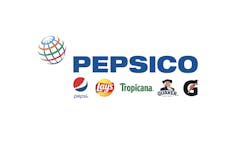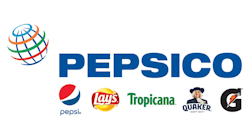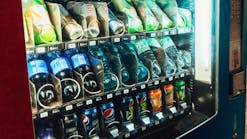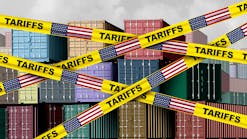PepsiCo reports fourth-quarter and full-year 2022 results; provides 2023 financial outlook
PepsiCo Inc. reported results for the fourth quarter and full-year 2022.
Chairman and CEO Ramon Laguarta, commented in the announcement. “We are pleased with our results for the fourth quarter and the full year as our business remained resilient and delivered another strong year of growth. Our results demonstrate that the investments we have made in our people, brands, portfolio, value chain, and go-to-market systems are working. Moving forward, we will continue to focus on driving growth and winning in the marketplace while developing advantaged capabilities to fortify our businesses for the longterm. This includes embedding pep+ at the center of our business in how we innovate, operate, run our teams, and build our brands. For 2023, we expect to deliver 6 percent organic revenue growth and 8 percent core constant currency earnings per share growth. We also announced a 10 percent increase in our annualized dividend, starting with our June 2023 payment which represents our 51st consecutive annual increase, and plan to repurchase approximately $1.0 billion worth of shares.”
Fourth-quarter 2022 reported division results
Frito-Lay North America
Operating profit increased 9%, primarily reflecting effective net pricing and productivity savings. These impacts were partially offset by certain operating cost increases, including strategic initiatives, a 19- percentage-point impact of higher commodity costs, primarily cooking oil, seasoning and potatoes, and higher advertising and marketing expenses. Additionally, impairment charges associated with a baked fruit convenient food brand reduced operating profit growth by 5 percentage points. The 53rd reporting week contributed 7 percentage points to operating profit growth.
Quaker Foods North America
Operating profit decreased 3%, primarily reflecting a 48-percentage-point impact of higher commodity costs, mainly grains and packaging materials, certain operating cost increases, including incremental transportation costs, and higher advertising and marketing expenses. These impacts were partially offset by effective net pricing and productivity savings. The 53rd reporting week positively contributed 7 percentage points to operating profit performance. Higher restructuring and impairment charges negatively impacted operating profit performance by 3 percentage points.
PepsiCo Beverages North America
Operating profit increased 13%, primarily reflecting effective net pricing, higher income from joint ventures and productivity savings. These impacts were partially offset by certain operating cost increases, including incremental informational technology costs, a 53-percentage-point impact of higher commodity costs, primarily fuel and resin, an organic volume decline and higher advertising and marketing expenses. The 53rd reporting week contributed 9 percentage points to operating profit growth. The lower net revenue due to the sale of Tropicana, Naked and other select juice brands and higher restructuring and impairment charges reduced operating profit growth by 32 percentage points and 9 percentage points, respectively.
Latin America
Operating profit increased 5%, primarily reflecting net revenue growth, productivity savings, a 7- percentage-point favorable impact of adjusting certain non-income tax accruals in Mexico and a 3- percentage-point favorable impact of lower charges taken as a result of the novel coronavirus (COVID-19) pandemic. These impacts were partially offset by certain operating cost increases, a 45- percentage-point impact of higher commodity costs, primarily cooking oil, grains and packaging materials, higher advertising and marketing expenses and a 4-percentage-point unfavorable impact of certain indirect tax credits in Brazil in the prior year. Additionally, a favorable adjustment to the final purchase price associated with our sale of certain non-strategic brands contributed 3 percentage points to operating profit growth.
Europe
Operating profit decreased 420%, primarily reflecting a 400-percentage-point unfavorable impact of impairment charges related to the SodaStream brand (other impairment charges). Operating profit performance was also negatively impacted by a 141-percentage-point impact of higher commodity costs, primarily packaging materials, cooking oil and potatoes, and certain operating cost increases. These impacts were partially offset by effective net pricing and productivity savings. Higher restructuring and impairment charges negatively impacted operating profit performance by 10 percentage points.
Africa, Middle East and South Asia
Operating profit decreased 148%, primarily reflecting a 105-percentage-point impact of impairment and other charges associated with our decision to sell or discontinue certain non-strategic brands and an investment (brand portfolio impairment charges) and a 21-percentage-point impact of impairment charges 3 primarily related to certain juice brands from the Pioneer Food Group Ltd. (Pioneer Foods) acquisition (other impairment charges). Operating profit performance was also negatively impacted by a 167- percentage-point impact of higher commodity costs, primarily grains, cooking oil and packaging materials, certain operating cost increases and higher advertising and marketing expenses, partially offset by net revenue growth and productivity savings. Unfavorable foreign exchange negatively impacted operating profit performance by 15 percentage points.
Asia Pacific, Australia and New Zealand and China Region
Operating profit decreased 215%, primarily reflecting a 237-percentage-point impact of impairment charges related to the Be & Cheery brand (other impairment charges) and a 6-percentage-point impact of impairment charges on certain property, plant and equipment due to the discontinuation of a non-strategic brand (brand portfolio impairment charges) in China. Operating profit performance was also negatively impacted by a 96-percentage-point impact of higher commodity costs, primarily potatoes and cooking oil, certain operating cost increases and higher advertising and marketing expenses, partially offset by net revenue growth and productivity savings. Unfavorable foreign exchange negatively impacted operating profit performance by 11 percentage points.
Full-year 2022 reported division results
Frito-Lay North America
Operating profit increased 9%, primarily reflecting the effective net pricing and productivity savings. These impacts were partially offset by certain operating cost increases, including strategic initiatives, a 17-percentage-point impact of higher commodity costs, primarily cooking oil, potatoes and seasoning, and higher advertising and marketing expenses. Additionally, impairment charges associated with a baked fruit convenient food brand reduced operating profit growth by 1.5 percentage points (other impairment charges). The 53rd reporting week contributed 2 percentage points to operating profit growth.
Quaker Foods North America
Operating profit grew 4.5%, primarily reflecting the effective net pricing and productivity savings. These impacts were partially offset by a 37-percentage-point impact of higher commodity costs, primarily grains and packaging materials, certain operating cost increases, including incremental transportation costs, the decrease in organic volume and higher advertising and marketing expenses. The 53rd reporting week contributed 2 percentage points to operating profit growth.
PepsiCo Beverages North America
Operating profit increased 122%, primarily reflecting a 124-percentage-point impact of the gain of $3.0 billion associated with the sale of Tropicana, Naked and other select juice brands partially offset by a 2- percentage-point impact of related transaction costs. Operating profit growth was also driven by the net revenue growth and productivity savings, partially offset by certain operating cost increases, including incremental transportation and information technology costs, and a 42-percentage-point impact of higher commodity costs, primarily aluminum and resin. A current-year gain associated with the sale of an asset and the 53rd reporting week contributed 6 percentage points and 2 percentage points, respectively, to operating profit growth. Additionally, operating profit growth was reduced by a 15-percentage-point impact of the lower net revenue due to the sale of Tropicana, Naked and other select juice brands.
Latin America
Operating profit increased 19%, primarily reflecting the net revenue growth, productivity savings and a 3- percentage-point favorable impact of lower charges taken as a result of the COVID-19 pandemic. These impacts were partially offset by certain operating cost increases, a 41-percentage-point impact of higher commodity costs, primarily cooking oil, packaging materials and grains, and higher advertising and marketing expenses. Additionally, impairment and other charges associated with the sale of certain nonstrategic brands reduced operating profit growth by 4.5 percentage points (brand portfolio impairment charges).
Europe
Operating profit decreased 207%, primarily reflecting a 110-percentage-point unfavorable impact of charges associated with the Russia-Ukraine conflict, a 98-percentage-point unfavorable impact of impairment charges related to the SodaStream brand (other impairment charges) and a 20-percentage point unfavorable impact primarily related to the impairment of intangible assets due to the discontinuation or repositioning of certain juice and dairy brands in Russia (brand portfolio impairment charges), partially offset by a 23-percentage-point favorable impact of the gain associated with the Juice Transaction. Operating profit performance was also negatively impacted by a 91-percentage-point impact of higher commodity costs, primarily packaging materials, raw milk and potatoes, certain operating cost increases, the organic volume decline, a 4-percentage-point impact of less favorable settlements of promotional spending accruals compared to the prior year and a 4-percentage-point impact of payments to employees for a change in pension benefits. These impacts were partially offset by the effective net pricing, productivity savings and lower advertising and marketing expenses. Unfavorable foreign exchange negatively impacted operating profit performance by 7 percentage points.
Africa, Middle East and South Asia
Operating profit decreased 22%, primarily reflecting a 19-percentage-point impact of impairment and other charges associated with our decision to sell or discontinue certain non-strategic brands and an investment (brand portfolio impairment charges) and a 4-percentage-point impact of impairment charges primarily related to certain juice brands from the Pioneer Foods acquisition (other impairment charges). Operating profit performance was also negatively impacted by a 74-percentage-point impact of higher commodity costs, primarily packaging materials, grains and cooking oil, certain operating cost increases and higher advertising and marketing expenses, partially offset by the net revenue growth and productivity savings. Unfavorable foreign exchange negatively impacted operating profit performance by 9 percentage points.
Asia Pacific, Australia and New Zealand and China Region
Operating profit decreased 20%, primarily reflecting a 25-percentage-point impact of impairment charges related to the Be & Cheery brand (other impairment charges). Operating profit performance was also negatively impacted by a 25-percentage-point impact of higher commodity costs, primarily cooking oil and potatoes, certain operating cost increases and higher advertising and marketing expenses, partially offset by the net revenue growth and productivity savings. Additionally, prior-year impairment charges associated with an equity method investment positively contributed 3 percentage points to operating profit performance. Unfavorable foreign exchange negatively impacted operating profit performance by 4 percentage points.
Guidance and outlook
For 2023, the company expects:
• A 6 percent increase in organic revenue;
• An 8 percent increase in core constant currency EPS;
• A core annual effective tax rate of 20 percent; and
• Total cash returns to shareholders of approximately $7.7 billion, comprised of dividends of $6.7 billion and share repurchases of $1.0 billion.
In addition, the company expects an approximate 2-percentage-point foreign exchange translation headwind to impact reported net revenue and core EPS growth based on current market consensus rates. This assumption and the guidance above imply 2023 core EPS of $7.20, a 6 percent increase compared to 2022 core EPS of $6.79.









